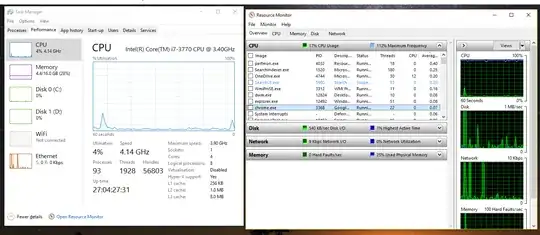As stated in the comments, your processor supports Intel Turbo Boost Technology.
If you are not scared by (very slightly) technical papers, I suggest you to take a quick look at that paper.
Your CPU is the 3770 which is designed to operate safely1 at 3.40 GHz.
However, that CPU has four cores and as fewer cores are active the total thermal power decreases; so the engineers at Intel thought given the conditions they can safely increase the clock on the few cores that remain active.
Intel Turbo Boost basically increases the clock of active CPU cores up to 3.90 GHz as long as the power/thermal consumption remains under safe operating limits.
Paradoxically this is only possible only the CPU is somewhat idle, as explicitly stated in the paper linked before:
For example, one
particular processor may allow up to two
frequency steps (266.66 MHz) when just one core
is active and one frequency step (133.33 MHz)
when two or more cores are active. Therefore,
higher deep C-state residency (“C3” or “C6”) on
some cores will generally result in increased core
frequency on the active cores.
Don't make the mistake of thinking that a higher speed means a busier CPU.
Quite the opposite!
As a rule of thumb, the CPU can use a higher clock for short periods or with low performance demanding2 software.
The real thing is a closed-loop control:
These
constraints are managed as a simple closed-loop
control system.
When temperature,
power or current exceed factory configured limits
and you are above the base operating frequency,
the processor automatically steps down core
frequency in order to reduce
temperature, power and current. The processor
then monitors temperature, power, and current
and continuously re-evaluates.
Intel Turbo Boost Technology is active as long as the Power profile is what is technically called P0 (in ACPI jargon).
This means that if you enable "Max performance" in the settings of the OS, the processor will remain at 3.90 GHz on "idle" or "near-idle".
Regarding the measure of 4.14 GHz from task manager, I am highly skeptical about overclock.
Intel processors don't have a direct way to report the current operating frequency. In the same old paper linked at the beginning, Intel gives an algorithm to estimate the running frequency and says:
Due to
the way the BIOS and OS communicate Intel®
Turbo Boost technology, software may never
detect core clock frequencies above the base
operating frequency
Being an estimate it can be off by some value, 4.14 GHz over 3.90 GHz is a 6% error which to me is not enough to indicate any overclocking, though I may be wrong here.
I'm not even sure the 3370 as an unlocked multiplier (should end in k?)
My guess is that Task Manager is doing its best to estimate the current frequency but it is not always accurate.
1 In terms of current/power consumption and temperature.
2 In the sense that not all functional units of the processor are used.
